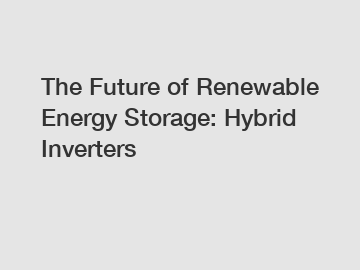The Future of Renewable Energy Storage: Hybrid Inverters
The Future of Renewable Energy Storage: Hybrid Inverters.
We live in a world where renewable energy sources are progressively replacing traditional fossil fuels. Solar panels and wind turbines are becoming more prevalent, allowing us to harness the power of the sun and wind to generate clean and sustainable electricity. However, the intermittent nature of these sources poses a challenge: how can we efficiently store and manage this energy for use when the sun doesn't shine and the wind doesn't blow? This is where hybrid inverters come into play, offering a promising solution to the future of renewable energy storage.
Hybrid inverters are advanced devices that intelligently integrate multiple energy sources, such as solar panels, wind turbines, and even traditional power grids, with energy storage systems. These inverters act as the brain behind a renewable energy system, managing the flow of electricity and optimizing energy storage. By combining renewable energy sources with storage capabilities, hybrid inverters bridge the gap between intermittent generation and uninterrupted power supply.

One of the key advantages of hybrid inverters is their ability to convert direct current (DC) electricity generated by solar panels or wind turbines into alternating current (AC) electricity for immediate use or storage. This conversion ensures compatibility with standard electrical devices and allows excess energy to be stored in batteries or other storage systems. When the renewable energy sources are not generating enough power, the hybrid inverter seamlessly switches to drawing electricity from the stored energy, ensuring a steady supply of power to meet your needs.
In addition to their energy conversion abilities, hybrid inverters also offer advanced energy management features. These inverters employ sophisticated algorithms to optimize the use of renewable energy and store excess power efficiently. For example, during peak sunlight hours, the hybrid inverter may prioritize sending electricity to the grid or charging the batteries, ensuring maximum energy utilization. On cloudy or low-wind days, the hybrid inverter may draw power from the batteries or grid, minimizing reliance on fossil fuels and reducing electricity costs.
The future of renewable energy storage lies not only in efficient energy management but also in the seamless integration of hybrid inverters with smart grids and Internet of Things (IoT) technologies. Smart grids facilitate bidirectional communication between energy users, producers, and hybrid inverters. This two-way communication allows for real-time energy monitoring, enabling users to make informed decisions regarding energy usage and storage. Furthermore, IoT technologies enable remote configuration and monitoring of hybrid inverters, making it easier to optimize performance and troubleshoot any issues.
With the rise of electric vehicles (EVs) and their increasing demand for charging infrastructure, hybrid inverters are expected to play a crucial role in balancing energy supply and demand. These inverters can be integrated into EV charging stations, making them smart and capable of managing energy distribution based on real-time data. This integration ensures the efficient use of renewable energy, reduced strain on the grid, and faster charging times for EV owners.
Hybrid inverters also contribute to a more sustainable future by reducing reliance on fossil fuels and minimizing carbon emissions. By effectively using renewable energy sources and storing excess energy, these inverters allow for greater energy autonomy and resilience. They unlock the potential for off-grid living and provide renewable power solutions in remote areas or during emergencies. In the long run, widespread adoption of hybrid inverters will lead to a more reliable, decentralized, and environmentally friendly energy infrastructure.
In conclusion, hybrid inverters represent the future of renewable energy storage. Their ability to seamlessly integrate multiple energy sources with storage systems, along with advanced energy management features, positions them as the key technology to bridge the gap between intermittent renewable generation and uninterrupted power supply. With the inclusion of smart grid and IoT technologies, hybrid inverters offer an intelligent and sustainable solution for optimizing energy usage, reducing costs, and minimizing carbon emissions. As we continue to transition towards renewable energy, hybrid inverters will play a crucial role in shaping a more efficient and environmentally friendly energy landscape.
For more ac coupled inverters, hybrid storage inverter for sale, grid-tied ac-coupled inverterinformation, please contact us. We will provide professional answers.
123
0
0


Comments
All Comments (0)